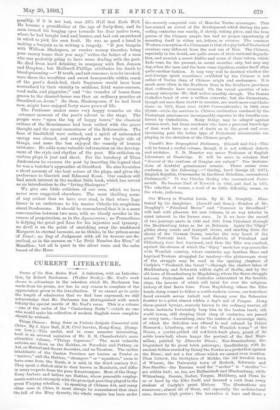Owr Wherry in Wendish Lands. By H. M. Doughty. Illus-
trated by his daughters. (Jarrold and Sons.)—Readers of Mr. Doughty's "Friesland Mores" and "Summer in Broadlaud " will hail with pleasure his new volume, in no way inferior in quiet interest to the former ones. In it we have the record of two journeys made in 1890 and 1891 from Friesland through the Mecklenburg lakes as far as Bohemia. Again the 'Gipsy' glides along canals and tranquil rivers, and starting from the shores of the German Ocean, reaches the very heart of the great Teutonic land. The coast-districts of Friesland and Oldenburg were first traversed, and thus the Elbe was reached, against the stream of which the Gipsy' made her way across the wide Wendish country, where centuries ago heathen Slays and baptised Teutons struggled for mastery—the picturesque story of the struggle may be read in the opening chapters of Carlyle's Frederick the Great "—through the shallow lakes of Mecklenburg and Schwerin within sight of Berlin, and by the old town of Brandenburg to Magdeburg, where the fierce struggle between Protestants and Catholics culminated in the terrible siege, the horrors of which will taint for ever the religious history of that fierce time. From Magdeburg, where the Elbe bends sharp round to follow a south-eastern course, our travellers fared onwards across Anhalt and Saxony over the Bohemian frontier to a point almost within a day's sail of Prague. Along these quaint byways, scarcely known to the ordinary tourist, all whose instincts fortunately keep him in the beaten track, old- world towns, still sleeping their sleep of centuries, are passed at every turn,—Lauenburg, once the centre of a sovereign state, of which the dukedom was offered to and refused by Prince Bismarck ; Luneburg, one of the "six Wendish towns" of the Hansa, a quaint-gabled old red-brick-built place, proud of its noble town-hall, where hangs the portrait of the first Maxi- milian, painted by Albrecht Diirer ; Neu-Brandenburg, dis- tinguished by its great brick gateways ; Quecllinburg, with its ancient Schloss erected by Henry the Fowler as a protection against the Runs; and not a few others which we cannot even mention.
Schwerin Then LUbeck, the birthplace of Moltke, the old Swedish town of Wismar, the University town of Rostock, and Neu. Strelitz—the Russian word for "archer " is " strelits "- are within hail ; so, too, are Halberstadt and Blankenburg, while Wittenberg, Dessau, Zerbst, Torgau, Mtihlberg, and Pirna lie on or hard by the Elbe itself, and demand a visit from every student of Caxlyle's great History. The illustrations are numerous ; almost all of them, and especially the architectural ones, deserve high praise ; the narrative is here and there a little too much taken up with what was done rather than with what was seen, but this is scarcely a fault; the descriptions are graphic, and show a full appreciation of the peculiar beauties and quaintnesses of the scenes they deal with. No one who has followed Mr. Doughty as far as the Friesland border, where his previous volume left the reader, should fail to accompany him on this further and even more attractive voyage of the 'Gipsy.'



































 Previous page
Previous page